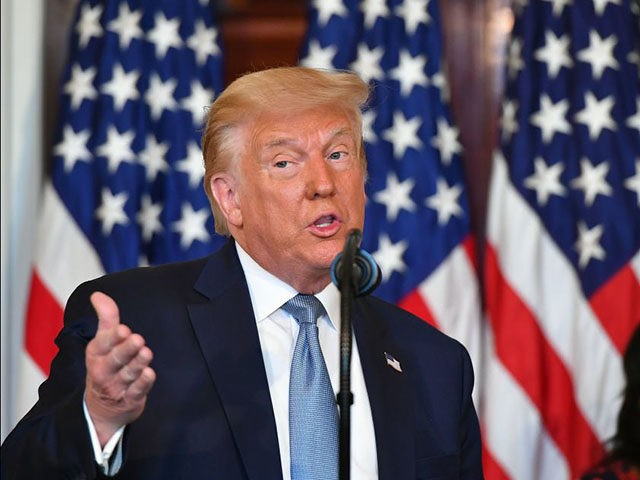A Rasmussen poll released late last week found 57 percent of likely U.S. voters agree with President Donald Trump’s statement that “restoring patriotic education” is essential to rebuilding a “shared national identity focused on common American values and virtues.”
Trump said during a press conference last week, that the violent riots conducted by Marxist groups in American cities are “a result of left-wing indoctrination in our nation’s schools and universities.”
“Many young Americans have been fed lies about America being a wicked nation plagued by racism,” the president continued, adding:
The only path to unity is to rebuild a shared national identity focused on common American values and virtues, of which we have plenty. This includes restoring patriotic education in our nation’s schools, where they’re trying to change everything that we’ve learned. What we’ve learned — in fact, what most of you have learned, they want to change it. They want to change it for whatever reason — cancel culture — whatever you want to call it.
In the survey of 1,000 likely U.S. voters, 57 percent agreed with Trump’s statement, while 30 percent disagreed, and 14 percent were undecided.
With political affiliation as a factor, 78 percent of Republicans agreed with a need to restore “patriotic education,” while 43 percent of Democrats and 49 percent of voters unaffiliated with either party said the same.
According to the survey, which has a margin of error of +/- three percentage points with a 95 percent level of confidence, 40 percent of all voters rated America’s public schools as good or excellent, with 43% stating they believe most textbooks are more concerned with providing content that is politically correct rather than accurate.
Some blue states, however, have moved ahead with revisionist American history curricula.
Virginia Gov. Ralph Northam (D), for example, praised the work of his state’s African American Education Commission which provided recommendations Northam said “will help ensure we tell a more honest Virginia story in our classrooms.”
The work of the African American History Education Commission over the past year has been important—and long overdue.I…
Posted by Governor of Virginia on Monday, August 31, 2020
Northam, who in 2019, denied wearing blackface or a Ku Klux Klan costume in a yearbook photo, but admitted he darkened his face in 1984 when he wore a Michael Jackson costume, wrote in his introduction to the commission’s report that Virginia is “a state that for too long has told a false story of ourselves.”
“The story we tell is insufficient and inadequate, especially when it comes to Black history,” the governor continued. “It is our job — all of us that make up this diverse society — to ensure that when the next generation looks back — a generation that is hopefully more inclusive than we have been — they see a more accurate narrative, one that tells the truth, and includes everyone.”
Virginia Gov. Ralph Northam denies being in racist yearbook photo but says it has reminded him of "other mistakes" from that time in his life, such as darkening his face for a Michael Jackson costume. "I did not understand the harmful legacy of an action like that" pic.twitter.com/C9dxmryblJ
— CBS News (@CBSNews) February 2, 2019
Similarly, California’s Ethnic Studies curriculum, recently approved by the legislature, awaits Gov. Gavin Newsom’s (D) signature.
“Our schools have not always been a place where students can gain a full understanding of the contributions of people of color and the many ways throughout history — and present day — that our country has exploited, marginalized, and oppressed them,” State Superintendent of Public Instruction Tony Thurmond said in a statement in July.
California Assemblyman Jose Medina (D), who introduced the bill to require the curriculum, said, “Ethnic studies courses empower students and help build culturally competent citizens.”
“Requiring ethnic studies will help ensure that all students learn a more holistic and representative history of the United States,” he added.

COMMENTS
Please let us know if you're having issues with commenting.